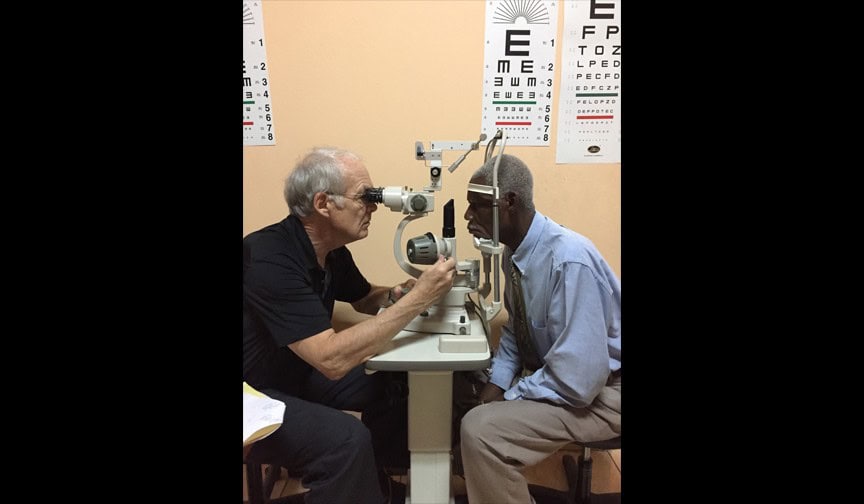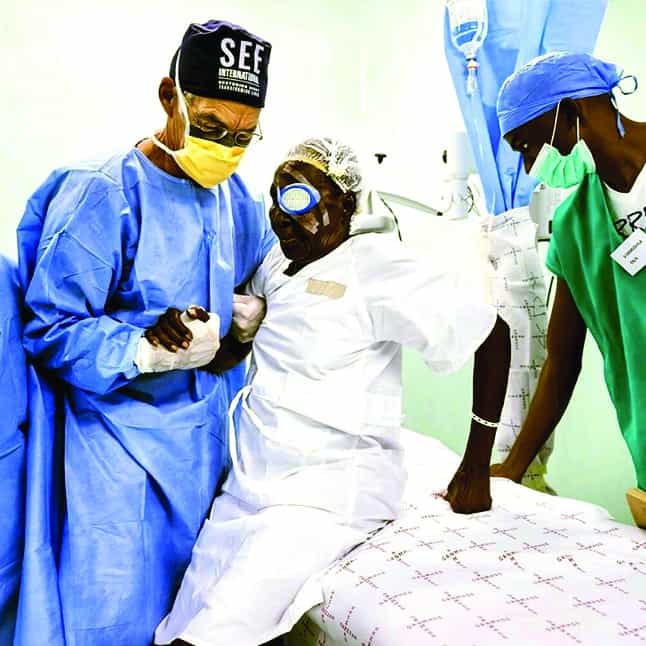
Dr. Reed Kindermann gives the gift of sight to the nearly blind in third world countries.

In one week, Dr. Reed Kindermann and his team can transform more than 400 lives taking the nearly blind and giving them the gift of sight. On a typical week, the longtime Moorestown resident tends to South Jersey residents’ eyes at his Cherry Hill-based office, but at least once a year, Kindermann and his wife Greta journey to Haiti or Namibia with Surgical Eye Experts International to perform life-changing surgeries.
SEE is a nonprofit organization that sends eye surgeons to developing countries around the world to provide medical and educational services. Kindermann has volunteered with the organization since graduating medical school.
He said around the time he was training to become an eye surgeon at Wills Eye Hospital, he had a professor with a passion for overseas work who introduced him to the possibilities of aiding people abroad. Shortly after graduation, he began steadily volunteering every year and has continued to do so.`

Kindermann said he thinks he first came into contact with SEE at an eye doctor conference. He said unlike other organizations where he’s had to travel and then help set up the clinic, through SEE everything is already arranged, and when he and his fellow doctors arrive, they can get straight to work.
He said SEE identifies areas that have large numbers of patients who need eye care but do not have enough supplies or surgeons.
When they take on their SEE assignments, the Kindermanns have two major jobs. The first is getting all the of the supplies donated to SEE packed up, put on a plane and in country with them. On their most recent trip to Haiti in March, the Kindermanns filled an entire cargo van and their SUV with supplies.
The Kindermanns cover the cost of their own travel expenses and were delighted when their friend Amy Webb, president of the the Rotary Lunch Club of Moorestown, informed them the Rotary had fundraised $2,500 to assist SEE with purchasing surgical supplies.
“For a community organization to look outside the community and the state and look abroad, it was a wonderful surprise,” Kindermann said.
Once, they’ve arrived at their destination, the Kindermanns tackle their second jobs. Kindermann performs the surgeries while Greta keeps track of the books taking detailed census notes about the patients being operated on, which she submits to SEE at the end of the trip.
“It’s a lot of time and a lot of work, but once we get there, we just have a great time,” Kindermann said.
For five days, these hospitals become something of a “cataract surgical camp” with the entire hospital shut down to everything except emergencies. Kindermann said in Namibia six surgeons work side by side doing as many operations in a day as they can for a week. He said it’s high-volume surgery, and on average, they treat around 450 patients in a week.
“It’s like trying to operate in a bus terminal,” Kindermann said. “It’s just so busy and so many people are coming and going. It’s really amazing.”
In the United States, cataracts are typically treated with a phacoemulsification surgery using a computer-driven machine that makes the procedure minimally invasive through a small incision. Patients are given a twilight sedation to put them at ease and drops are used to put the eye to sleep.
When SEE’s doctors travel to third world countries, they can’t bring the machine because it is delicate and requires a stable power grid to work safely, and the twilight sedation isn’t readily available. So, surgeons perform the surgery by hand. Kindermann said the cases are often more difficult as well, given that most patients have deferred treatment for years.
Patients have a needle inserted behind their eye to put the eye to sleep, and the procedure is done without sedation. Kindermann said the Africans and Haitians have seen such hardship that they are largely stoic throughout the surgery despite not receiving sedation.
Kindermann said they operate on as many people as they can, and when they return for their follow-up visit the next day, many people who came in blind or nearly blind can see. He said grandmothers led in by their grandchildren can suddenly walk out on their own.
“It’s really amazing,” Kindermann said. “The joy is palpable.”
To learn more about SEE International, visit https://www.seeintl.org.









